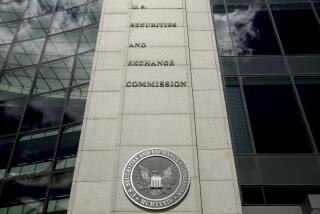Brokerages Will Need to Mend Many Fences
- Share via
Wall Street’s latest pledge to clean up its act is getting a skeptical reception from some individual investors.
At least that was the initial reaction Friday to the $1.4-billion settlement between federal and state regulators and 10 big brokerages designed to curb conflicts of interest among stock analysts.
“It’s going to be slow going to bring the average investor back to the market,” said Bob Byrd, a high school geometry teacher from Greenfield, Ind., who has had money in stocks in recent years. “This doesn’t take the fear out.”
Indeed, it’s clear that Wall Street still has a long way to go to restore people’s faith after feeding them years of allegedly biased research aimed at winning juicy investment banking deals -- not at honestly evaluating a company’s prospects.
“I will treat Wall Street in the future as it has treated me,” said Frank Glaser, a retiree from Rancho Palos Verdes, who added that he doesn’t trust analysts “any further than I can throw them.”
Under the settlement, major brokerages are required to hire at least three outside firms to provide stock research that supplements their own work. Among the independent researchers expected to get a boost from the accord are Value Line Inc. and Standard & Poor’s.
The settlement terms apply only to the 10 large brokerages that are parties to the agreement. It remains to be seen whether the Securities and Exchange Commission will follow up with industrywide regulations that extend to regional investment houses.
Though regulators have said they wanted to create a restitution fund to reimburse small investors for some of their stock market losses, the structure of such a fund has not been determined. And it’s unclear whether it actually would be established.
For individual investors, then, the value of the settlement ultimately may hinge on how stock research is refined and distributed.
In general, it’s “debatable” whether so-called independent analysts are any better than those working at major investment banks, said Tom Carter, chief financial officer of StarMine Corp. in San Francisco, which tracks analyst performance on and off Wall Street.
What’s more, any analyst’s track record can be deceiving. “It’s just like trying to pick mutual funds: Past performance is no guarantee of future success,” said Jay Ritter, finance professor at the University of Florida.
Chuck Hill, director of research at analyst tracker Thomson First Call, said certain independent research boutiques probably would refuse to make their reports widely available. That’s because their institutional customers pay top dollar and will not want to see the work handed out to the general public, he said.
Some individuals say they are inclined to do their own research, anyway.
“I figure [the professionals] don’t know any more than I do,” said Tricia Cardinale, a hairstylist in Los Angeles who is a member of an investment club. “You have to do your homework. You have to find a company with a track record.”
Another area covered by the settlement is initial public offerings. The pact bans steering hot new stock offerings to a few select customers -- a practice known as “spinning.” Still, that’s no guarantee that small investors will get a crack at coveted IPO shares. Customers with clout still are likely to get preferential treatment, Ritter said.
Despite the uncertainties, many investment pros said they believed the plan would level the playing field on Wall Street.
“It’s going to improve the independence and objectivity of research to the point where it was, and where it should be again,” said Ed Wedbush, chief executive of Wedbush Morgan Securities, an L.A.-based brokerage and investment bank.
But many remain skeptical. Marilyn Barrett, a Los Angeles attorney and an investor, said analysts and executives -- not just their firms -- should be punished.
“This type of conduct can too easily become a cost of doing business,” she said. “Unless you hold the individuals accountable, the same abuses will come back again.”
*
Times staff writers E. Scott Reckard and Thomas S. Mulligan contributed to this report.
More to Read
Inside the business of entertainment
The Wide Shot brings you news, analysis and insights on everything from streaming wars to production — and what it all means for the future.
You may occasionally receive promotional content from the Los Angeles Times.










